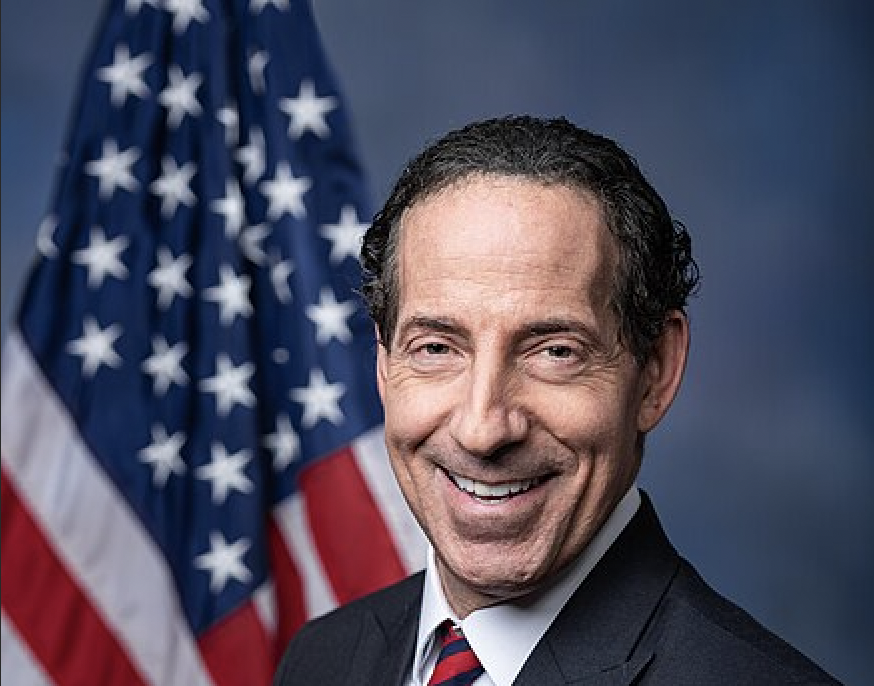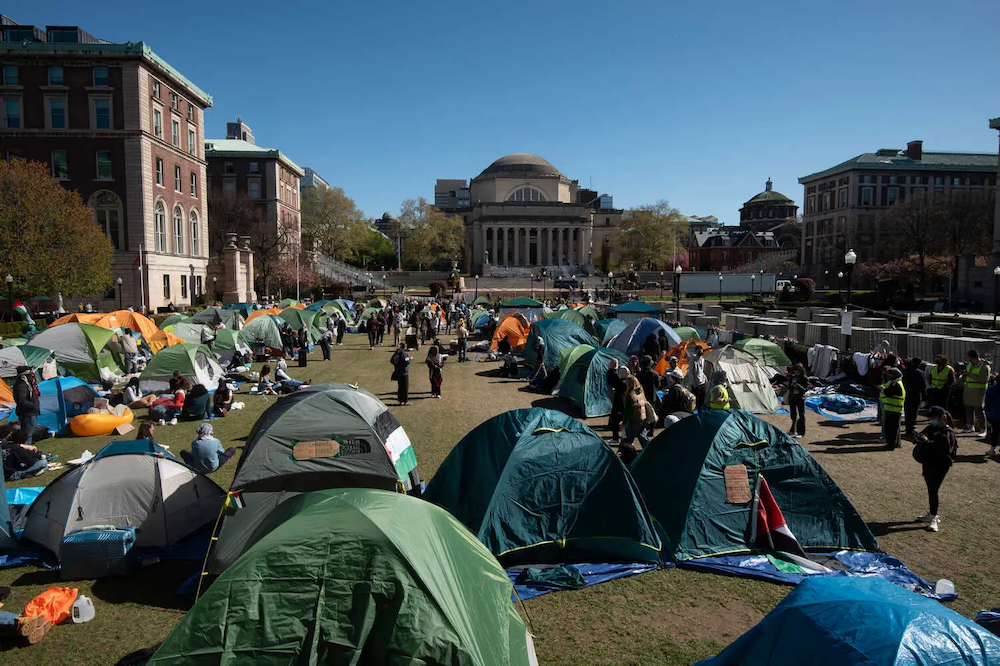Free Speech Project Conversations

A Conversation with Congressman Jamie Raskin
Sanford J. Ungar, director of the Free Speech Project, spoke with Congressman Jamie Raskin (D-Maryland) about free speech, politics, American democracy, and the 2024 U.S. Presidential Election.
Recorded September 13, 2024

Peace and Protest on American Campuses
During the spring semester of 2024, protests raged across many American campuses over the Israel-Hamas war and other volatile issues. In some cases, these demonstrations devolved into hate-filled rhetoric, physical encampments, mass arrests, and destruction of property. The turmoil led to questions about the future of protest on campus, and whether reasonable limits can be devised to prevent interference with the educational and research processes that are the central purpose of universities.
On international, legal, environmental, and social topics, grassroots movements and advocacy groups have long driven social change in America, often beginning with campus protests. But in an era of deep divisions in the country’s politics, can the right to protest be preserved without indulging hate speech and compromising public safety?
Featured: David Cole, professor at Georgetown University Law Center, former national legal director of the ACLU; Justin Hansford, executive director of the Thurgood Marshall Civil Rights Center and professor, Howard University School of Law; Anemona Hartocollis, national reporter for The New York Times, covering higher education; Nadine Strossen, former national president of the ACLU and professor at New York Law School
Recorded September 4, 2024

The Puzzle of Julian Assange and His Prosecution
In 2010, Julian Assange burst into the international glare after his Wikileaks website published classified materials obtained from soldier Chelsea Manning – including footage of a U.S. airstrike in Baghdad that killed at least 11 civilians. Indicted in the United States on 17 espionage charges that carry a maximum prison sentence of 175 years, he has emerged as a divisive figure. Once he came out of nearly seven years of refuge in the Ecuadoran Embassy in London, Assange was arrested and has now been cleared for extradition by the British authorities; but he has appealed that decision. Some say he is being unfairly punished for exposing war crimes, while others contend he damaged diplomacy and harmed U.S. national security. Many believe that if he is convicted, journalists around the world who investigate and write about national security matters will themselves be in danger of prosecution.
At this live, in-person event on the Georgetown campus, we will hear from Assange’s father and his brother, who have made a documentary film about his case, as well as a former FBI agent who has herself become a whistleblower, and a professor of international politics at Middlebury College who doubts Assange’s journalistic or whistleblower credentials.
Source: Assange Indictment
Panelists include Gabriel Shipton, brother of Assange, producer of the film “ITHAKA”; John Shipton, father of Assange, subject of the film “ITHAKA”; Allison Stanger, professor of international politics and economics, Middlebury College; and Jane Turner, whistleblower, former special agent, Federal Bureau of Investigation
Recorded March 14, 2023

Banning Books: Censorship, Parental Rights, and the Future of Intellectual Curiosity
Over the past few years, public school boards and state governments across the United States have been restricting specific books from being taught in their classrooms or circulating in school libraries. Books about sexual identity, sexual activity, gender identity, and racial identity have been especially targeted. Reacting to or instigating parental concerns, local and state politicians have advocated close scrutiny of certain books, and in some places book burnings have resulted. Many contend that these assaults on books are politically motivated censorship, fuel a culture war, and drive an unnecessary moral panic.
Amidst this ongoing debate, might the First Amendment and its guarantee of Free Speech offer some wisdom on how to navigate these issues? Is there a line to be drawn somewhere between censorship and parental rights?
Panelists include Timothy Anderson, Republican member, Virginia House of Delegates; Jonathan Evison, author of Lawn Boy, New York Times Bestseller; Nadine Farid Johnson, managing director, PEN America, Washington, D.C.; and Rosemary Kilkenny, vice president for institutional diversity and equity, Georgetown University.
Recorded October 3, 2022.

“The Slap” – A Free Speech Perspective
A cruel joke by one entertainer, a foolish and violent act by another? A celebration ruined? Or an awkward and ugly symbol of our polarized times? However one interprets “the slap,” attendees of the 2022 Academy Awards and viewers around the world were stunned and confused when actor Will Smith assaulted comedian Chris Rock for a remark aimed at Smith’s wife, Jada Pinkett. Politically and culturally, what are the Free Speech implications of this incident that caught the attention of tens of millions of people around the world? Were real or imagined lines crossed, and what lessons are to be taken from it?
Panelists include Randall Kennedy, professor at Harvard Law School and author of Race, Crime, and the Law; Nadine Strossen, former national president of the American Civil Liberties Union and professor at New York Law School; and Eisa Nefertari Ulen, journalist, professor of Black diaspora literature at Hunter College and fiction writing at Baruch College.
Recorded April 7, 2022.

Does Our “Knowledge” These Days Rely on Facts, Rumors, or Bogus Theories?
From climate change to a global pandemic and even a presidential election, a tradition of national trust in expertise and authority has been pushed aside in the United States, in favor of random personal opinions, rumors, and even conspiracy theories perpetuated on social media. But if an educated populace is essential for democracy to function effectively, how might we address the surging confusion and cynicism among the general public? How can we mitigate the problem of false equivalencies that have invaded dialogues on scientific, technical, political, and social issues? What is the impact on Free Speech as we know and practice it?
Panelists include David Dunning, a social psychologist who studies human misbelief and disbelief; Fathali Moghaddam, a political psychologist who examines the cognitive processes underlying democracy and dictatorship; Danielle K. Brown, a scholar of political communication who investigates the intersection of news media, underserved and historically excluded communities, and social justice efforts; and Briony Swire-Thompson, a senior research scientist who investigates what drives belief in inaccurate information.
Recorded on February 28, 2022.

The Future of Fox News
Fox News: To its cult-like following, it is the only place to get reliable information about American politics, popular culture, and world affairs. To its detractors, it has long since suspended practicing journalism and become a pure propaganda vehicle for the Republican Party and especially Donald Trump.
What role was Fox originally intended to play? How did that change? What is the secret of its ratings success, and do its leaders feel any embarrassment over being regarded as an increasingly partisan enterprise? Do some of its stars and their popular programs actually aggravate the problem of political and social polarization in the United States?
Panelists include the original president of Fox News, media analysts for National Public Radio and The Washington Post, and a longtime Washington columnist for The Chicago Tribune.
Recorded November 18, 2021

Speaking Freely with Scott Martin
Sanford Ungar, director of the Free Speech Project, interviews State Senator Scott Martin, who represents the 13th District of Pennsylvania (Lancaster County). They discuss Scott’s proposed bill that would hold protesters who are convicted of certain crimes financially responsible for the costs associated with their protest.
Recorded on May 14, 2018.

Speaking Freely with Emma Llansó
Sanford Ungar discusses the Free Speech rights of internet users and the moderation of online content with Emma Llansó, director of the Free Expression Project at the Center for Democracy and Technology.
Recorded on April 23, 2018.

Speaking Freely with Eugene Scott
Sanford Ungar discusses the crossroads of identity politics and Free Speech with Eugene Scott, Political Reporter for The Washington Post.
Recorded on April 20, 2018.

Speaking Freely with Aaron Hanlon
Sanford Ungar discusses the complexities and controversies surrounding the invitation of speakers to college campuses with Aaron Hanlon, assistant professor of English at Colby College.
Recorded on April 20, 2018.

Speaking Freely with Zach Wood
Sanford Ungar, director of the Free Speech Project at Georgetown University, discusses the invitation of inflammatory speakers to college campuses with Zach Wood from “Uncomfortable Learning” at Williams College.
Recorded on March 26, 2018.

Speaking Freely with Cindy Cohn
Sanford Unger, director of the Free Speech Project at Georgetown University, discusses issues of Free Speech and privacy in the internet age, with Cindy Cohn of the Electric Frontier Foundation.
Recorded on February 22, 2018.

Speaking Freely with Marc Howard and Vince Greco
Sanford Ungar, director of the Free Speech Project at Georgetown University, discusses the free speech rights of the 2.3 million incarcerated Americans, with Marc Howard, professor of government and law at Georgetown, and prisoner rights advocate Vince Greco.
Recorded on February 22, 2018.

Speaking Freely with Bradley Shear
Sanford Ungar discusses digital privacy for young people with attorney Brad Shear, founder of Digital Armour.
Recorded on January 24, 2018.

Speaking Freely with Ronald Krotoszynski
Sanford Ungar, director of the Free Speech Project at Georgetown University, discusses Free Speech from a cross-cultural prospective with Ronald Krotoszynski, professor of law at the University of Alabama.
Recorded on January 19, 2018.

Speaking Freely with Phil Roe
Sanford Ungar, director of the Free Speech Project at Georgetown University, discusses Free Speech on college campuses with Congressman Phil Roe of Tennessee.
Recorded on December 6, 2017.

Speaking Freely with David Sanger
Sanford Ungar, director of the Free Speech Project at Georgetown University, discusses First Amendment issues surrounding the news coverage of national security with David Sanger from The New York Times.
Recorded on December 4, 2017.

Speaking Freely with Anita Levy
Sanford Ungar, director of the Free Speech Project, discusses free speech issues on college and university campuses with Anita Levy of the American Association of University Professors.
Recorded on December 4, 2017.

Speaking Freely with Katherine Culliton-González:
Sanford Ungar, director of the Free Speech Project, discusses the conflict between Free Speech and other democratic values with Katherine Culliton-González from Demos, a public policy organization working toward equality in America.
Recorded on November 16, 2017.

Speaking Freely with Andrew Sullivan
Sanford J. Ungar, director of the Free Speech Project at Georgetown University, discusses the Free Speech crisis in America with Andrew Sullivan from New York Magazine.
Recorded on November 10, 2017.

Speaking Freely with Adam Liptak
Sanford J. Ungar, director of the Free Speech Project at Georgetown University, discusses the Supreme Court’s jurisprudence on First Amendment issues with Adam Liptak from The New York Times.
Recorded on November 10, 2017.

Speaking Freely with Catherine Ross
Sanford J. Ungar, director of the Free Speech Project at Georgetown University, discusses the First Amendment rights of elementary, middle and high school students with Catherine J. Ross, professor at George Washington University School of Law.
Recorded on October 11, 2017.

Speaking Freely with Arthur Spitzer
Sanford J. Ungar, director of the Free Speech Project at Georgetown University, discusses a First Amendment dispute between the Washington Metropolitan Area Transit Authority and the American Civil Liberties Union with Art Spitzer, the legal director of the ACLU for the District of Columbia.
Recorded on October 11, 2017.

Speaking Freely with Joe Cohn:
Sanford J. Ungar, director of the Free Speech Project at Georgetown University, discusses campus speech issues and state legislation with Joe Cohn from FIRE, the Foundation for Individual Rights in Education.